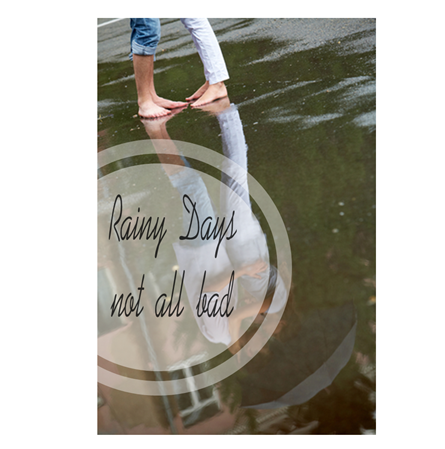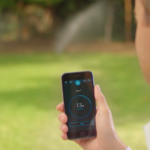Have you ever been headed out to work on a rainy morning and seen one of your neighbors’ sprinkler systems running? Most of us have and it always sticks out in your mind as such a waste. Where we live in Birmingham, AL, there’s a huge commercial property on Hwy 280 that seems to always run the irrigation in the rain. My wife calls it the anti-rain sensor. She says they must have rain sensors on their system that detect rain and turn their system on! I’m sure it doesn’t really run every time it rains, but you can see how the perception can easily get blown up, because people just hate seeing water being wasted. But does every sprinkler system really need a rain sensor?
First, let’s take a closer look inside rain sensors.
How rain sensors work

Cross-section of a Hunter Wireless Rainclik
The two leading manufacturers of irrigation products, Rain Bird and Hunter, both make rain sensors and both detect rain using the same method. They have a series of porous cork discs that when they get wet from rain, they expand and force the sensor to prevent the controller from watering. After the cork discs dry out, the sensor will let the controller know that it is dry and the controller can resume with its programmed watering schedule. This is true of both wired and wireless rain sensors.
If you find that your rain sensor is not keeping your controller off for a long enough period of time or if it is turning your controller back on too soon after the rain event, the rain sensor can be easily tuned. There is a simple adjustment on the sensor that will allow the sensor to dry out faster or slower or somewhere in between. It is as simple as turning the adjustment mechanism on the sensor, so that the discs are exposed to more air on the sides or less air. The more air that is exposed, the faster the sensor dries out, which allows the controller to get back to watering its normal program. And of course the reverse is also true, so if the adjustment is closed all the way, there is no exposure to air on the sides and only the top would be exposed, so that the same amount of rain would keep the controller interrupted from running for a longer period of time. Of course the longer the system’s watering schedule is interrupted the less water you use, but if your hydrangeas are drooping, you may prefer an adjustment that would turn the controller back on sooner. On a typical summer day in Birmingham, AL, a rain sensor may keep the system from watering for one to three days after it rains, depending on the sensor settings, the amount of rainfall and how windy and hot it is in the time following the rainfall.
What is the return on the investment for rain sensors?
Water and sewer rates in Birmingham, AL are continuously on the rise, so it’s important to investigate every possible water-saving opportunity. A simple add on to any sprinkler system is the Hunter Wireless Rain Click and it could save you hundreds or even in excess of $1,000 per year. Some municipalities charge more for water than others, so if water is expensive at your home or business, then a rain sensor is practically a necessity if you have a sprinkler system.
So just how much water can a rain sensor save on a typical sprinkler system? Let’s look at an example of a home that has water service from the Birmingham Water Works. A small sprinkler system that has 6 zones to water the grass and each zone waters for 30 minutes every time the sprinkler system runs. This would be a total of 3 hours run time or 180 minutes with approximately 20 gallons per minute running through the system for a total of 3600 gallons of water. At $5.36 per 1,000 gallons of water, one cycle would cost $19.29. So every time the rain sensor kept this system from running during the rain, the property owner would save $19.29 on the water bill. Once it prevented watering ten times during the rain, it more than paid for itself. Now that’s something to dab about!
What is the downside to rain sensors?
For less than $200 installed, you’re not getting a weather station or anything that will run your sprinkler system according to the local weather forecast. The difference means that your sprinkler system will skip a watering cycle if it’s raining at the time it was scheduled to start, but it will not skip a cycle if it has a start time prior to rain in the forecast. When the clouds start sending down the wet stuff, rain sensors cause the irrigation controller to skip a cycle. If it is scheduled to run at 4A and there is rain in the forecast for 2P, the sprinkler system will still run that morning. However, it will not run during a rain event and that makes it worth its weight in gold.
To make sure you’re not the laughing stock of your street, at least not for anything your sprinkler system does, go ahead and have a rain sensor installed.
Do rain sensors break?
Any time I make a purchase for my personal home, I think about the total cost of ownership. What’s this new gadget going to cost me to maintain and how soon will it need replacing? I’ve installed hundreds of rain sensors around Birmingham, AL and find them to be very reliable and not much of a headache at all. I have run across some very old ones that needed replacing, but the majority last many years and do exactly what they are supposed to do. They’re really a little gem of a gadget and I love offering them to my customers, because of that.
Can I live without a rain sensor?
In the majority of circumstances a rain sensor is essential to saving water, but in some cases you could do without a sensor, it really depends on how you personally use your sprinkler system. For instance if you always have your system in the off position and just run a manual cycle on the controller when you want to water your landscape, then a rain sensor will not have any added benefit to the system. However, by running your sprinkler system in this manner, you are most likely not capitalizing on the optimum time of day to water, which is early in the morning to limit the amount of water lost to evaporation and wind. It is typically cooler and less windy in the morning, so more of the water coming from your system makes it onto your landscape, rather than evaporating or drifting away through the air. But, for most of us in order to start your sprinkler system around 4 of 5am, it is necessary to program our controllers so that we do not have to get up earlier than we would like, just to turn on the sprinkler system and thus a rain sensor is necessary at this point just in case it rains overnight or in the morning before you can get to your controller to turn it off.
Shorter answer, you can live without a rain sensor, but why would you want to?
Do you live in the greater Birmingham, AL area? You’re in luck, so do we! Click here for amazing service.







